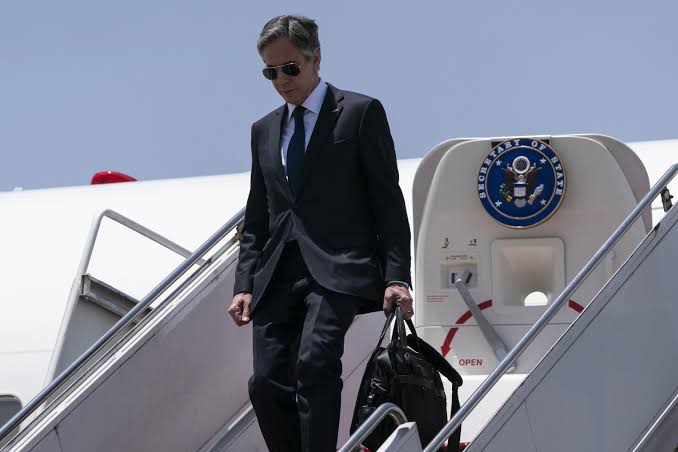Israeli-Palestinian tensions are on the rise, the Russian invasion of Ukraine, Iran’s nuclear program, and the three-day Middle East visit of US Secretary of State Antony Blinken have all taken top priority on his agenda.
Blinken will go to Cairo before continuing on to Jerusalem and Ramallah on Monday and Tuesday, when he will see Mahmoud Abbas, the president of the Palestinian Authority, and Benjamin Netanyahu, the prime minister of Israel.
Blinken’s trip had been organized with Netanyahu’s new right-wing government as its main focus due to worries about Israel’s future leadership and the deadlock in its peace negotiations with the Palestinians.
But on Thursday, after Israeli troops killed nine Palestinians and a Palestinian carried out a reprisal shooting attack in occupied East Jerusalem that killed seven Israelis outside a synagogue the next day, the visit had a new importance.
Saturday saw a second attack. There are growing concerns that the already spiraling violence may worsen.
Blinken will reiterate American appeals for restraint and stress the importance of Washington’s support for a two-state solution in discussions with the new Israeli administration, which includes ultra-nationalist parties that want to speed up settlement construction in the occupied territories.
Blinken will also visit Ramallah where he will meet with Abbas, senior Palestinian leaders, and representatives of civil society. According to US State Department spokesperson Vedant Patel, Blinken will urge “generally for efforts to be done to de-escalate tensions” with both leaders.
Analysts questioned if Blinken could make any significant advancements.
Veteran US negotiator Aaron David Miller said, “The absolute best they can do is to keep things steady to avoid another May 2021,” alluding to the 11-day conflict between Israel and Hamas that was resolved with an Egyptian-brokered truce.
Former Palestinian official Ghaith al-Omari, who works at The Washington Institute, predicted that Blinken would rehash established US viewpoints rather than venture into uncharted territory.
The journey itself, he claimed, is the message. He stated of the Palestinians, “Blinken will encourage Abbas to do more, but it is not obvious what they can do.”
The Israeli judiciary has been proposed to undergo a significant overhaul by the government of Benjamin Netanyahu. While weakening the Supreme Court’s authority to strike down laws or rule against government action, the proposal would increase political control over the appointment of judges.
Large-scale protests against the measures against what opponents view as the possible undermining of judicial independence have taken place in the streets.
Blinken will also advocate for maintaining the status quo in the Al-Aqsa Mosque compound, where Jews are not allowed to pray, according to the US State Department.
The site was defiantly visited by Itamar Ben-Gvir, a far-right politician who serves as Netanyahu’s security minister, in early January, sparking concerns of bloodshed and pleas for the status quo from Jordan, the guardian of Muslim and Christian sites in the Holy Land.
Pope Francis urged both parties to avoid escalation. The Catholic pontiff stated on Sunday that “the death spiral that increases day by day only closes the small glimmers of trust that exist between the two peoples.”
In their discussions, Blinken and Egyptian President Abdel Fattah el-Sisi are likely to bring up the unrest in Palestine. Despite US President Joe Biden’s criticism of el-record Sisi’s on human rights, el-Sisi has benefited from Egypt’s longstanding role as a Middle East mediator.
According to the State Department, Blinken will also talk about regional concerns in Egypt, including the wars in Sudan and Libya.
Egypt continues to be one of the major recipients of US military aid, but due to el-record Sisi’s on human rights, some Democratic Party members are questioning the partnership.
Authorities freed hundreds of political prisoners last year, but according to rights organizations, there are still around 60,000 people detained, many of whom are subjected to severe conditions and are housed in packed cells.
The 11-month-old conflict fought by Russia in Ukraine will also be discussed. Israel has been requested to deliver missile systems to shoot down drones, including those provided by Israel’s regional foe Iran, by Ukraine, which has received military hardware from the US and Europe.
Israel has rejected these demands. Israel has expressed its condemnation of the Russian incursion but has restricted its support to humanitarian aid and protective gear, citing a wish to maintain relations with Moscow about its war-torn neighbor Syria and a duty to safeguard Russian Jews.
The Biden administration’s efforts to resurrect a 2015 nuclear deal have stagnated, and there is no Plan B to stop Iran from acquiring a weapon, so the diplomats will also talk about Iran’s nuclear program.





